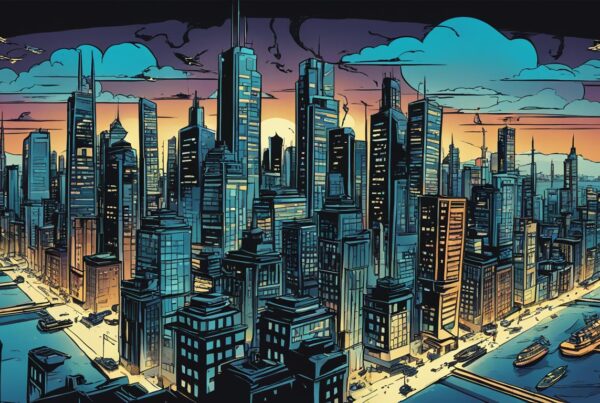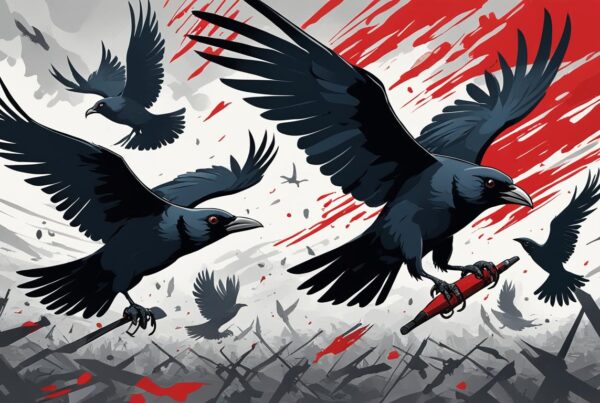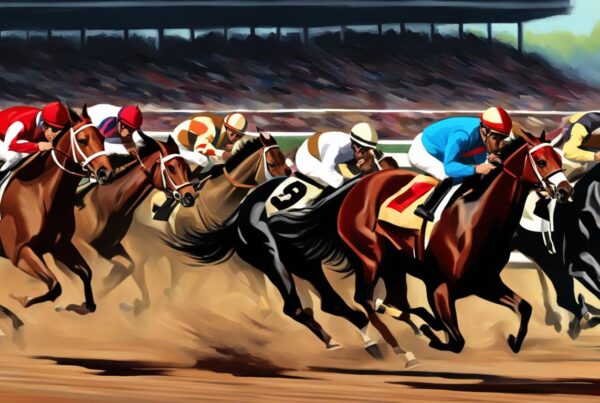Mario Vargas Llosa’s “Literatura y política” is a thought-provoking book that offers an in-depth analysis of the fascinating relationship between literature and politics. The author explores how literature has been utilized as a tool for political expression, advocacy, and critique, as well as the various ways in which it resonates with readers, shaping political discourse and influencing public opinion.
In this article, we will delve into the key themes and ideas presented in “Literatura y política”, examining how they contribute to our understanding of the intricate relationship between literature and politics. We will also explore Mario Vargas Llosa’s background, literary and political influences, and his contributions to this ongoing dialogue.
Key Takeaways:
- Mario Vargas Llosa’s “Literatura y política” offers valuable insights into the intricate relationship between literature and politics.
- Literature can be utilized as a powerful political tool, promoting ideologies and driving social and political change.
- Writers play a crucial role in shaping political discourse and influencing public opinion through their works.
- Political fiction, satire, and themes of resistance and revolution are prevalent in literature and have been instrumental in various cultural movements and social changes.
- Literature contributes to the formation of political identity, depicting cultural values and fostering a sense of belonging.
Introduction to “Literatura y política”
Mario Vargas Llosa’s “Literatura y política” is a thought-provoking book that delves deep into the relationship between literature and politics. Throughout the book, Vargas Llosa explores the intricate ways in which these two spheres intersect and influence each other. The book presents a rich tapestry of literary analysis and political analysis that offers valuable insights into the power of words and their impact on society.
Vargas Llosa’s motivation for writing “Literatura y política” stems from his own personal experiences as a writer and political activist. As a Nobel Prize-winning author and former Peruvian presidential candidate, he brings a unique perspective to the discussion of literature and politics. In the book, Vargas Llosa argues that literature has the power to shape political discourse and cultural norms, and he provides compelling examples to support his argument.
The central themes and ideas presented in “Literatura y política” make it an essential read for anyone interested in the ways in which literature and politics can influence each other. This book offers a complex and nuanced exploration of the relationship between these two fields, providing readers with valuable insights into the power and potential of literary works to effect social and political change.
Mario Vargas Llosa’s Background and Influences
Mario Vargas Llosa was born in Arequipa, Peru in 1936 and grew up with a strong passion for writing and literature. He studied at the National University of San Marcos in Lima and went on to pursue a career in journalism, which heavily influenced his later literary works.
Vargas Llosa’s literary influences include renowned writers such as Fyodor Dostoevsky, William Faulkner, and James Joyce. These authors, known for their exploration of the human condition and societal issues, inspired Vargas Llosa to incorporate similar themes into his own writing.
Vargas Llosa’s political experiences have also played a significant role in shaping his perspectives on literature and politics. He was an avid supporter of the Cuban Revolution in his early years, but later became disillusioned with communism, advocating for neoliberalism and free-market policies. This political evolution is evident in his literary works, which often examine societal issues through a critical lens.
Exploring Literature as a Political Tool
Literature has been utilized as a powerful tool for political expression, propaganda, and social critique throughout history. From pamphlets to novels, authors have used their works to convey their political messages or promote specific ideologies to shape public opinion.
Political propaganda has been a significant application of literature as a political tool. Governments and political organizations use literature to promote their agendas and ideologies. For instance, during the Second World War, Nazi Germany used literature to spread propaganda that reflects their political ideology of racial superiority.
However, literature can also be used to critique societal issues and injustices. Social critique is a common theme in literature and is often used to observe and analyze real-world problems. This type of literature allows readers to experience different societal perspectives, unveil corrupt power structures, and promote social justice.
“Literary works are the products of powerful minds that can evoke emotions and influence the behavior of readers. They can use narrative and character development to emphasize political themes subtly, drawing readers closer to the ideology”
Authors use different literary devices and techniques such as allegory, satire, and hyperbole to convey their political messages and ideologies. Through these literary devices, they can craft stories that enable readers to gain a deep understanding of the political issues in the world. This genre of literature is essential in generating political discussions and influencing public opinion.
In conclusion, literature is a powerful tool used to convey political messages subtly, promote political agendas, or expose societal injustices. As such, literature is an integral element of political discourse and a means for promoting societal change.
The Role of Writers in Shaping Political Discourse
Writers have always had the power to influence political discourse and shape public opinion. Through their literary works, authors can offer insights into political and social issues, providing a platform for critical thinking and discussion. The messages conveyed by authors can spark debates and inspire change, challenging the status quo and driving progress.
Writers can be influential figures in society, using their platform to advocate for causes and issues they believe in. Their words have the potential to reach a vast audience and bring attention to important topics, such as inequality, human rights, and political corruption.
The impact of writers on political discourse can be far-reaching, as their messages continue to resonate with readers long after their works have been published. Writers offer unique perspectives on current events and societal issues, providing valuable insights into the complex world of politics.
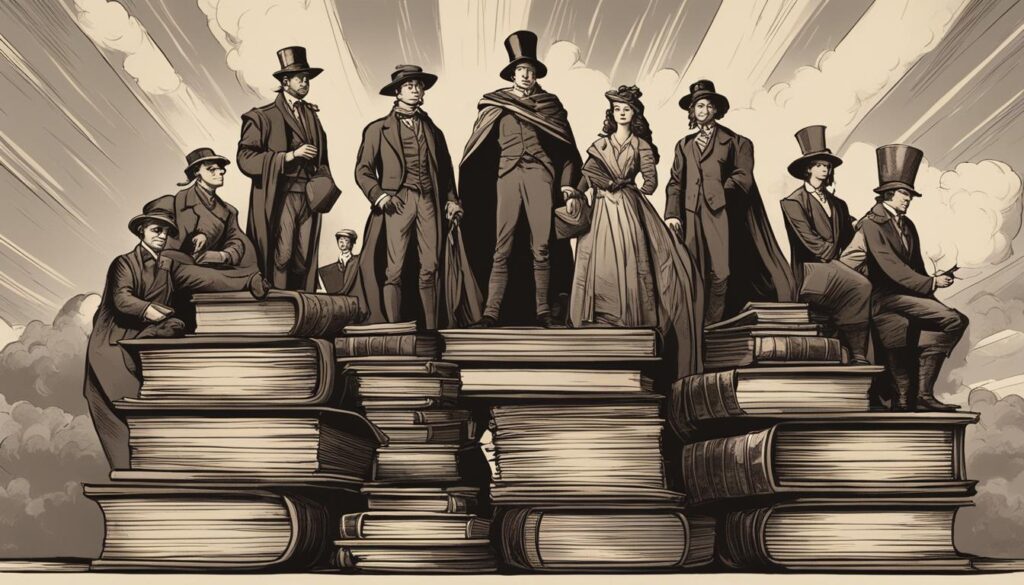
“The power of the writer is demonstrated not only in their ability to critique the world but also to change it.” – Chinua Achebe
Literature and Political Activism
The relationship between literature and political activism can be traced back to the earliest forms of cultural expression. Throughout history, literary works have served as powerful tools for inspiring social justice and promoting cultural movements.
One example of such literature is the abolitionist novel “Uncle Tom’s Cabin” by Harriet Beecher Stowe. Published in 1852, this novel depicted the harsh realities of slavery in the United States and played a significant role in shaping public opinion towards the abolitionist movement.
Similarly, works such as James Baldwin’s “The Fire Next Time” and Gloria Anzaldúa’s “Borderlands/La Frontera” have been instrumental in promoting social justice and spurring cultural movements. Baldwin’s essays on racial inequality and Anzaldúa’s exploration of Chicano identity continue to resonate with readers and inspire activism today.
“The function of the writer is to make revolutions; his judgment is to be tested not by the beauty or the sense of his language, but by his capacity to make real in his readers the injustice which he describes.” – James Baldwin
Literature has been particularly effective in giving voice to marginalized groups and promoting social change. Works such as “The Color Purple” by Alice Walker and “The Feminine Mystique” by Betty Friedan have highlighted the experiences of women and contributed to the feminist movement.
Moreover, the power of literature to inspire change is not limited to specific social movements or cultural contexts. Across different time periods and geographical regions, literary works have been used to challenge power structures, promote societal transformation, and advocate for justice.
Literary Analysis of Political Fiction
Political fiction is a genre that has been widely employed by authors seeking to convey political messages to their readership. Through the use of narrative techniques, such as character development and plot structure, authors can effectively communicate their political ideologies and critiques of societal issues. Narrative analysis can thus provide valuable insights into the ways in which political fiction works, and the impact it can have on readers.
One important aspect of political fiction is character development, where protagonists and supporting characters are fleshed out and imbued with specific values, beliefs, and motivations. By doing so, authors can use their characters to express and criticize political ideologies, as well as to provide nuanced explorations of complex issues. For example, George Orwell’s “1984” portrays Winston as a disillusioned protagonist who challenges the oppressive regime of Big Brother. Winston’s character development drives the narrative and ultimately inspires readers to question the power dynamics present in their own society.
Narrative analysis can also provide insight into the plot structure of political fiction, unpacking the ways in which authors use storytelling to convey their political messages. Elements such as foreshadowing, metaphor, and symbolism are frequently employed to create a rich and layered narrative that engages the reader on both a personal and political level. For example, Margaret Atwood’s “The Handmaid’s Tale” uses the metaphorical imagery of women’s oppression to critique the patriarchy and religious fundamentalism.
Overall, literary analysis of political fiction provides a valuable means of understanding the ways in which authors employ narrative techniques to convey their political messages. The genre serves as a powerful tool for social critique and commentary, inspiring readers to question existing power structures and work towards societal change.
Historical Context and Political Novels
In political novels, historical context plays a crucial role in shaping the themes and plotlines. Societal changes and historical events can influence the portrayal of political systems, power dynamics, and social norms in these literary works.
For example, the 19th-century novel “Les Misérables” by Victor Hugo provides a commentary on the political and social climate of post-Napoleonic France. The novel portrays the struggles of the poor and working-class individuals in a society that is dominated by the rich and powerful. Similarly, George Orwell’s “Animal Farm” is a social commentary on the Soviet Union’s political system and the rise of communism.
The historical context of these works adds depth and relevance to the political commentary and social critique presented in the novels. Incorporating historical context in political novels allows readers to better understand and contextualize the themes and messages conveyed.
Literature as a Reflection of Political Systems
Literature serves as a powerful tool for critiquing and reflecting on different forms of political systems, including democracies, monarchies, dictatorships, and oligarchies. Through subtle imagery and metaphors, authors can convey complex political messages and stimulate readers’ critical thinking about various societal norms.
One example of literature as a reflection of political systems is George Orwell’s “Animal Farm.” This novel serves as an allegory for the Soviet Union under Stalin’s rule, where the working-class animals overthrow the farmer, only to find themselves oppressed by the new pig leaders. Through this narrative, Orwell critiques the power dynamics of Stalin’s dictatorship and the unjust treatment of the working-class citizens.
“All animals are equal, but some animals are more equal than others.” – George Orwell, “Animal Farm”
Another example is the novel “1984” also by George Orwell, which portrays a dystopian society under a totalitarian government. This depicts the dangers of totalitarianism and serves as a cautionary tale about the exploitation of power and the suppression of free speech in political systems.
Overall, literature provides a valuable lens for examining the complexities of political systems and their power dynamics. By analyzing the portrayal of different forms of government and societal norms in literature, readers can develop a greater understanding of the political landscape and become more informed citizens.
The Power of Satire in Political Literature
Political satire, a form of humor used to criticize political figures, systems, and ideologies, has long been a powerful tool in literature. Satirical works can be found across a range of genres, from novels to cartoons, and have the ability to provoke thought and initiate change. The use of humor and irony in political satire allows authors to critique societal issues, social norms, and political corruption in a way that is engaging and accessible to readers.
Satirical works can be instrumental in sparking conversation about political issues and calling attention to instances of injustice. By using humor to challenge political power dynamics or expose hypocrisy, authors can encourage readers to question their own perspectives and beliefs. In this way, satire can foster a sense of critical thinking and civic engagement.
“Satire is the weapon of the powerless against the powerful.” – Molly Ivins
Much of the power of political satire lies in its ability to use humor to soften the delivery of critical social commentary. Satirical works can also serve as a form of social criticism, drawing attention to inequalities and injustices in a compelling and thought-provoking way. By highlighting the flaws and inconsistencies in the political landscape through humor, satire can expose corruption and promote social change.
An excellent example of political satire in literature is George Orwell’s “Animal Farm.” Orwell’s satirical take on the Russian revolution is a commentary on the dangers of totalitarianism, and the ways in which corrupted political leaders can manipulate public perception for their own benefit. The use of animals as characters in the novel allows Orwell to use humor to criticize Soviet leaders without naming them directly, making the work an enduring commentary on political corruption.
Overall, political satire in literature is a powerful tool for social and political commentary. By using humor and irony to critique political systems and figures, authors can generate conversation and promote social change. The use of satire in political literature has proven itself to be an effective and engaging way to expose societal flaws and advocate for political reform.
Themes of Resistance and Revolution in Literature
Literature has long been used as a vehicle for resistance and revolutionary ideals, providing writers with a platform to advocate for social change and challenge oppressive political systems. Through their works, authors can shed light on otherwise overlooked societal issues and injustices, creating space for critical conversations and promoting collective action.
Resistance literature, often associated with social movements or marginalized communities, aims to subvert dominant power structures and promote lasting social change. Revolutionary ideals are at the heart of this genre, challenging readers to imagine a world beyond the current political status quo and providing a roadmap for achieving meaningful progress.
“The role of the writer is not simply to communicate ideas; it is to struggle against entropy and reification and the status quo, to disturb, to arouse, to educate, to horrify, to enlighten, to redeem, to change.” – Toni Morrison
The themes of resistance and revolution have been explored in literature across genres, ranging from dystopian novels to memoirs of political activism. These works often showcase the power of collective action and the importance of challenging societal norms to effect meaningful social change.
| Examples of Resistance and Revolutionary Literature | Author |
|---|---|
| The Handmaid’s Tale | Margaret Atwood |
| Invisible Man | Ralph Ellison |
| The Autobiography of Malcolm X | Malcolm X and Alex Haley |
The impact of resistance literature and its contributions to social change cannot be understated. Through literature, readers can connect with experiences beyond their own and gain a deeper understanding of the world around them. By amplifying underrepresented voices and challenging oppressive systems, resistance and revolutionary literature continue to be integral to the ongoing fight for justice and equality.
Literature and Political Identity
Literature has the power to shape political identity by reflecting and reinforcing cultural values and beliefs. National literature, in particular, plays an essential role in fostering a sense of belonging and pride in one’s country and heritage.
Through the depiction of historical events, societal norms, and power structures, literature can offer insights into the complexities of political identity. It can also challenge existing beliefs and encourage critical thinking about one’s place in society.
“In my view, all literature, regardless of its place of origin, reflects the values and identity of the culture from which it emerged.” – Chimamanda Ngozi Adichie
However, the depiction of political identity in literature is not without controversy. Critics argue that national literature can become a tool for promoting exclusionary and nationalist ideals, rather than celebrating diversity and inclusivity.
Despite these debates, literature remains a powerful medium for exploring and understanding political identity. By spotlighting diverse perspectives and exploring political themes, literature can broaden our understanding of ourselves and the world around us.
Criticisms and Controversies surrounding Political Literature
Political literature has always been a topic of controversy and criticism due to its ability to influence people’s beliefs and opinions. One of the main controversies surrounding political literature is censorship. Some governments or institutions believe that certain political works should not be published or distributed because they may be harmful or offensive to society.
Furthermore, political literature often sparks moral debates on sensitive topics such as human rights, social justice, and equality. For instance, the publication of Harriet Beecher Stowe’s “Uncle Tom’s Cabin” caused a major moral debate, as it raised questions about the treatment of African American slaves in the United States during the 19th century.
Another aspect that fuels controversies in literature is the impact it has on different societies. Some works may trigger negative reactions or even violence due to their political nature. For instance, Salman Rushdie’s “The Satanic Verses” caused a lot of controversy and led to the author receiving death threats due to its perceived blasphemy towards Islam.
“Censorship is to art as lynching is to justice.” – Henry Louis Gates Jr.
Despite these criticisms and controversies, political literature will continue to be a powerful tool for expressing political views and challenging societal norms. It is essential to acknowledge that political literature is not meant for everyone, but rather for those who are willing to engage in critical thinking and open discussions about important issues.
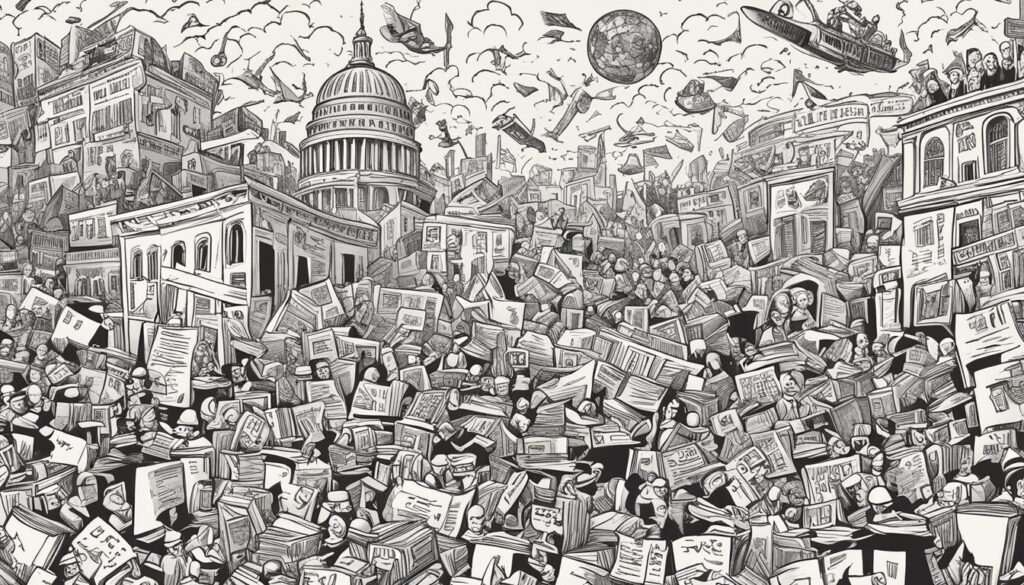
Mario Vargas Llosa’s Contributions to the Literature and Politics Dialogue
Throughout his prolific career, Mario Vargas Llosa has become a prominent voice in the ongoing dialogue between literature and politics. His extensive body of work includes novels, essays, and non-fiction texts that offer unique insights into the complex relationship between these two spheres.
Vargas Llosa’s literary analysis sheds light on the role that literature plays in shaping political discourse and influencing public opinion. His works demonstrate how literature can serve as a powerful tool for political expression and critique, as well as a means of promoting social and cultural change.
“Literature is a source of power precisely because it is simultaneous criticism and testimony, history and prophecy, possession and repudiation, anguish and exaltation: living knowledge.” – Mario Vargas Llosa
In addition to his literary contributions, Vargas Llosa has also presented compelling political theories throughout his career. In his non-fiction texts and public speeches, he has advocated for individual freedom, democratic governance, and market economies.
Despite the controversy that some of his political positions have generated, Vargas Llosa’s works continue to spark important debates and shape the discourse surrounding literature and politics.
Conclusion
In conclusion, the book “Literatura y política” by Mario Vargas Llosa provides a thought-provoking analysis of the complex relationship between literature and politics. Through his insightful examination of the intersection of these two spheres, Vargas Llosa offers a valuable perspective on the ways in which literature can serve as a tool for political expression, social critique, and cultural change.
Throughout the book, Vargas Llosa guides readers through a comprehensive exploration of the themes and ideas that underpin the political and literary worlds. He examines how authors utilize their works to convey political messages, promote ideologies, and critique societal issues. He also delves into the role of writers in shaping political discourse and influencing public opinion, as well as the ways in which literary works have been instrumental in various social justice movements and cultural shifts throughout history.
At the same time, Vargas Llosa acknowledges the controversies and criticisms that often surround political literature, including issues such as censorship, moral debates, and the impact of political literature on different societies. However, he highlights the potential for literature to foster political identity, promote national literature, and contribute to cultural pride.
In his unique contributions to the literature and politics dialogue, Vargas Llosa offers a wealth of literary analysis and political theories that continue to shape the field today. Overall, “Literatura y política” serves as a valuable resource for anyone looking to gain a deeper understanding of the intricate relationship between literature and politics.
FAQ
What is the book “Literatura y política” about?
“Literatura y política” is a book written by Mario Vargas Llosa that explores the intersection between literature and politics, revealing how these two spheres influence and interact with each other.
What can I expect from the introduction of “Literatura y política”?
The introduction of “Literatura y política” provides an overview of the central themes and ideas presented in the book, as well as the author’s motivations for delving into the relationship between literature and politics.
Can you provide some background information on Mario Vargas Llosa?
Certainly! Mario Vargas Llosa is a renowned author with a diverse background. This section will provide details on his upbringing, literary influences, and political experiences, offering valuable insights into his perspectives on literature and politics.
How does literature function as a political tool?
Literature has the power to serve as a political tool in various ways. In this section, we will examine how authors use their works to convey political messages, promote ideologies, and critique societal issues, making literature a potent medium for political expression.
What role do writers play in shaping political discourse?
Writers have a significant influence on shaping political discourse and influencing public opinion. We will explore how their words and ideas resonate with readers, sparking debates, and driving social and political change in this section.
How does literature contribute to political activism?
This section will delve into the relationship between literature and political activism. We will explore how literary works have been instrumental in various social justice movements and cultural shifts throughout history, highlighting the power of literature in driving political change.
How does political fiction employ narrative techniques to convey its message?
In this section, we will analyze the genre of political fiction, examining the narrative techniques employed by authors to convey their political messages. We will also explore how character development enhances the themes presented in these literary works.
Why is historical context important in political novels?
Historical context plays a crucial role in political novels as it informs the themes and plots of these literary works. This section will discuss how societal changes and historical events shape the narratives found within political novels.
How does literature reflect and critique political systems?
Literature serves as a reflection of political systems, offering insights into societal norms and power dynamics. In this section, we will analyze how different forms of government and power structures are portrayed in literary works.
What is the power of satire in political literature?
Satire is a potent tool in political literature, using humor and irony to critique political figures, systems, and ideologies. This section will examine how satirical works contribute to social criticism and provide a fresh perspective on politics.
What are some common themes of resistance and revolution in literature?
This section will focus on the themes of resistance and revolution in literature, exploring how authors use their works to advocate for societal change and challenge oppressive systems, inspiring readers to question the status quo.
How does literature contribute to political identity?
Literature plays a crucial role in shaping political identity, fostering a sense of belonging and cultural pride. In this section, we will discuss the prevalence of national literature, the depiction of cultural values, and the ways in which literature influences political identity.
What are some criticisms and controversies surrounding political literature?
Political literature often sparks controversies and criticisms in areas such as censorship, moral debates, and its impact on different societies. This section will address these issues, offering a nuanced perspective on the complexities of political literature.
What are Mario Vargas Llosa’s contributions to the literature and politics dialogue?
Mario Vargas Llosa has made significant contributions to the ongoing dialogue between literature and politics. This section will highlight his unique perspectives, theories, and literary works that have shaped the field, further enriching the study of literature and politics.
What is the conclusion drawn from the book summary of “Literatura y política”?
In conclusion, our exploration of Mario Vargas Llosa’s “Literatura y política” has provided valuable insights into the intricate relationship between literature and politics. Through this book summary, we have gained a deeper understanding of how literature can serve as a powerful tool for political expression, critique, and societal change.

